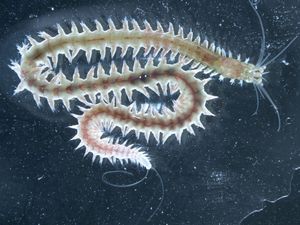Tagged: Cerebral Cortex
You Can't Always Get What You Want
According to a recent study, there are at least two neural correlates for decision-making in the brain.
If you’re the scarecrow in the Wizard of Oz who yearns for a brain, you have neither of these correlates. However, if you are someone who has frontal lobe damage to the orbitofrontal cortex (OFC), you have one functional neural correlate: for action value comparisons. You can make optimal decisions about how to get a brain (…although you obviously would already have one). Alternatively, you could have suffered damage to the dorsal anterior cingulate cortex (dACC) – in which case you would be able to make stimulus value comparisons and choose which objects are optimal, such as the wittiest or the most creative brain, but not how to get the chosen object. More
You’ve got a worm in your brain. Well, at least a part of one.
![]()
The cerebral cortex, a layer of neural tissue surrounding the cerebrum of the mammalian brain, has been known to play various roles in memory, language, thought, attention, and consciousness. Up until now, no invertebrate equivalent
 to the cerebral cortex has been encountered, but Detlev Arendt, Raju Tomer, and colleagues may have found an evolutionary counterpart. The obvious answer is hidden in one simple creature– the worm. Wait, what? Yeah, you heard me. The marine ragworm, found at all water depths, has been shown to possess a tissue resembling that of our mysterious cerebral cortex.
to the cerebral cortex has been encountered, but Detlev Arendt, Raju Tomer, and colleagues may have found an evolutionary counterpart. The obvious answer is hidden in one simple creature– the worm. Wait, what? Yeah, you heard me. The marine ragworm, found at all water depths, has been shown to possess a tissue resembling that of our mysterious cerebral cortex.
Arendt and his colleagues used a technique called cellular profiling to determine a molecular footprint for each kind of cell in this particular type of ragworm. By utilizing this technique, they were able to uncover which genes were turned on and off in each cell, providing a means for cellular categorization. Surprisingly, mushroom bodies, regions of the ragworm’s brain that are thought to control olfactory senses, show a striking similarity to tissue found in our cerebral cortex. This intriguing discovery may provide remarkable insight into the evolutionary basis of what has developed into an incredibly important cerebral structure.
Read more about this review here, or see the original article in Cell.